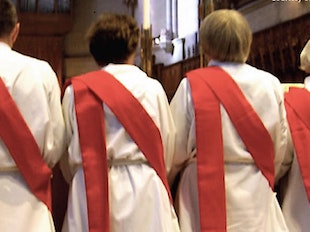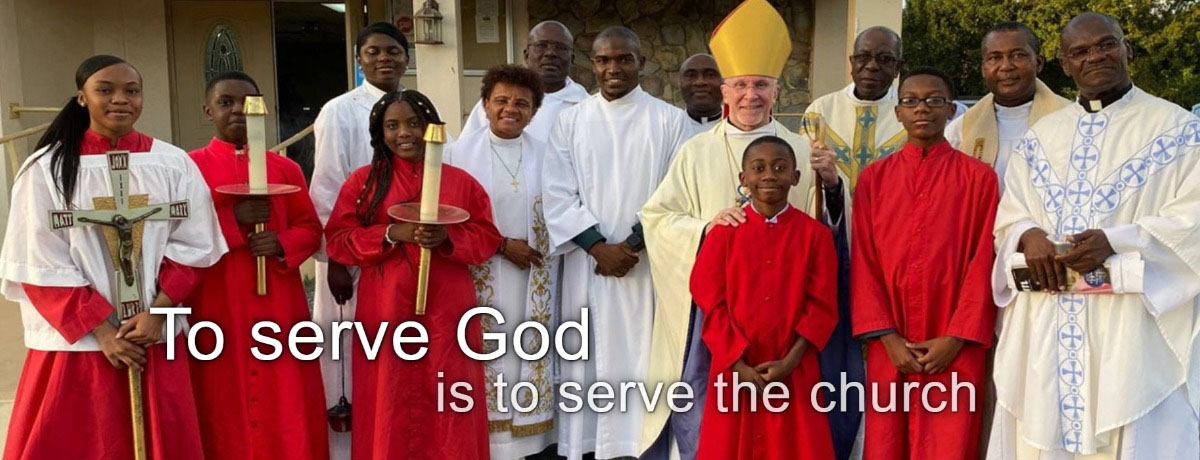Program for Diaconal Formation and Certificate in Diaconal Studies
 The CCFL’s program for diaconal formation trains persons to think and live theologically and to provide ecclesiastical leadership and service for the Episcopal Church in Southeast Florida.
The CCFL’s program for diaconal formation trains persons to think and live theologically and to provide ecclesiastical leadership and service for the Episcopal Church in Southeast Florida.
The program forms persons to engage intentionally in the baptismal and eucharistic life of Episcopal communities in the diocese, including congregations, schools, and special ministries, and to help Episcopalians in Southeast Florida embody our Christian story in the world.
By enriching an understanding of the ministry of the whole Church, graduates of the program take active roles in their congregations and in the diocese to help the Church discern and engage in the ministry of Christ in the world.
The program in diaconal formation is comprised of study, worship, fellowship, and reflection. Courses are offered online, but we also gather in person for prayer, learning, and mutual support. The level of study is challenging but accessible to all types of adult learners. We welcome students with advanced academic backgrounds and others with college degrees. Students with little formal education after high school are admitted with the permission of the Bishop.
The diaconal formation program addresses the basic subjects of theological education: biblical studies, including the study of the Hebrew Bible and New Testament; church history, including the history of the Episcopal Church and its place in the Anglican tradition; theology and ethics; spirituality; liturgy; practical ministry skills; and preaching. Typically, students will complete the program is a three-year sequence comprised of four quarter terms each year. Each quarter term (All Saints, Epiphanytide, Eastertide, and Pentecost) involves online courses, usually held in the evenings, and in-person weekend retreats from Friday evening through Saturday afternoon. Half-day retreats on Saturdays are also offered.
Students who wish to complete the entire three-year sequence of diaconal formation courses should plan to begin the fall term (All Saints Quarter) by taking the Introduction to New Testament and Introduction to Systematic Theology courses. With permission of the Academic Dean of the CCFL, you may take single courses that are of particular interest to you. The CCFL accepts coursework from other institutions and programs on a case-by-case basis.
Courses follow the seven canonical areas of theological education and formation for ordination as stipulated by General Convention 1970. These seven areas include:
- the Holy Scriptures;
- Church history, including the ecumenical movement;
- Christian theology;
- Christian ethics, and moral theology;
- studies in contemporary society, including racial and minority groups;
- liturgics and church music; and
- theory and practice of ministry.
Students who successfully complete the program receive a certificate in diaconal studies from the CCFL.
To begin your process of discernment for formation for the diaconate, you must first speak with the rector or priest-in-charge of your parish about your interest in ministry. You may also contact the chairs of the Commission on Ministry for more information about the steps that are involved in the discernment process. The Episcopal Church in Southeast Florida follows a specific procedure for the process for diaconal ordination. The process of discernment to leadership in this diocese follows three broad steps:
- Congregational Discernment. This is where you will meet with your priest and a spiritual director for about one year. Following these meetings, your priest will assist you in forming a Congregational Discernment Team (CDT) with whom you will follow a 10- phase curriculum to more clearly discern God’s call. The document, Congregational Discernment Team Handbook 2021, will detail these first steps. For many who are called to lay ministry, this will be the conclusion of the discernment process as the individual begins to exercise his or her leadership in ministry.
- Discernment Retreat. This is where you will meet with the Bishop and the Discernment Team after having completed the congregational discernment work in your parish. At the retreat there will be further discernment about the direction of formation. Some candidates will be recommended for formation for ordination, while others will be affirmed in their ministries as laypeople.
- Formation. After the Discernment Retreat, the Commission on Ministry will recommend to the Bishop a formation program that includes academic and spiritual formation. The CCFL will provide courses and an individualized educational plan that takes prior theological formation and education into account.
The first step is for you to contact your priest and begin a conversation with him or her about your experience. He or she will help you find a spiritual director, if you do not already have one, and in due course will discuss whether forming a CDT is the best next step for you in understanding and responding to your life as a baptized Christian.
For more information, please email the CCFL at ccfl@diosef.org
You may also reach out to the chairs of the Commission on Ministry:
The Rev. Sanford Groff sgroff@stmarkspbg.org
The Rev. Leslie Hague leslie@allsaintsfl.org
The Rev. Hal Hurley hal@diosef.org
May God bless you along this important journey as we seek to build God’s kingdom together.
A Word About Diaconal Formation
Neither matriculation in any of the concentrations of the CCFL curriculum nor the simple act of taking a course through the CCFL program will automatically guarantee admittance to the canonical ordination process. Changes in canonical status are determined on an individual basis for each student at the discretion of the Bishop, the Canon to the Ordinary, the Commission on Ministry, the Standing Committee for Ordination, and in consultation with the Dean (Director) of the CCFL. Students who wish to pursue ordination to the diaconate, or who feel a calling to ordained ministry in general, must speak with the Bishop and the Canon to the Ordinary before they can be approved to follow the processes established by the Commission on Ministry and affirmed by the Executive Board of the Diocese. Similarly, canonical aspirants may not be admitted to postulancy until they have satisfied the necessary canonical requirements, and the same holds true for postulants to ordination. Ordinands must satisfy their own requirements before ordination. Further information about this process may be obtained from the office of the Bishop, the Canon to the Ordinary, and the Commission on Ministry.

